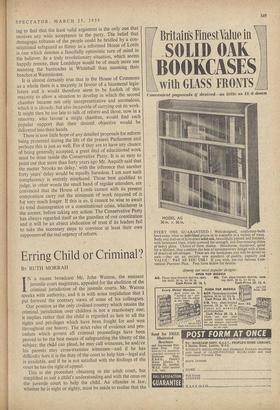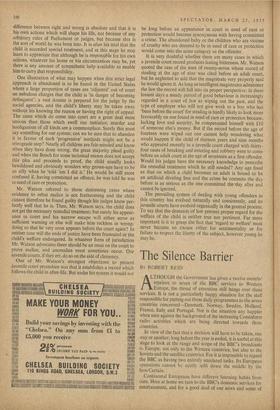Erring Child or Criminal?
BY RUTH MORRAH IN a recent broadcast Mr. John Watson, the eminent juvenile court magistrate, appealed for the abolition of the criminal jurisdiction of the juvenile courts. Mr. Watson speaks with authority, and it is with some trepidation that I put forward the contrary views of some of his colleagues.
Our position as the only civilised country which retains the criminal jurisdiction over children is not a reactionary one; it implies rather that the child is regarded as heir to all the rights and privileges which have been fought for and won throughout our history. The strict rules of evidence and pro- cedure which govern all criminal proceedings have been proved to be the best means of safeguarding the liberty of the subject; the child can plead, he may call witnesses, he and/or his parents may cross-examine witnesses—and if he has difficulty here it is the duty of the court to help him—legal aid is available, and if he is not satisfied with the findings of the court he has the right of appeal.
This is the procedure obtaining in the adult court, but simplified to suit a child's understanding and with the onus on the juvenile court to help the child. An offender in law. whether he is eight or eighty, must be made to realise that the difference between right and wrong is absolute and that it is his own actions which will shape his life, not because of any arbitrary rules of Parliament or judges, but because this is the sort of world he was born into. It is after his trial that the child is accorded special treatment, and at this stage he may learn to appreciate that although he is responsible for his own actions, whatever his home or his circumstances may be, yet there is any amount of sympathetic help available to enable him to carry that responsibility.
One illustration of what may happen when this strict legal approach is abandoned is to be found in the United States where a large proportion of cases are 'adjusted' out of court on nebulous charges that the child is 'in danger of becoming delinquent'; a vast dossier is prepared for the judge by the social agencies, and the child's liberty may be taken away without his knowing the reason or having the right of appeal. The cases which do come into court are a great deal more serious than those which swell our statistics; murder and hooliganism of all kinds are a commonplace. Surely this must say something for our system; can we be sure that to abandon it in favour of such 'progressive' metbods might not be a retrograde step? Nearly all children are fair-minded and know when they have done wrong; the great majority plead guilty and when the Bench for some technical reason does not accept this plea and proceeds to proof, the child usually looks bewildered and obviously wonders why grown-ups have to be so silly when he 'told 'em I did it.' He would be still snore confused if, having committed an offence, he was told he was in need of care or protection.
Mr. Watson referred to those distressing cases where evidence to rebut malice is not forthcoming and the child cannot therefore be found guilty though his judges know per- fectly well that he is. Then, Mr. Watson says, the child does not get the necessary remedial treatment; but surely his appear- ance in court and his narrow escape will either serve as sufficient warning or else will make him reckless in wrong- doing so that he very soon appears before the court again? In neither case will the ends of justice have been frustrated or the child's welfare endangered. In whatever form of jurisdiction Mr. Watson advocates there should be an onus on the court to prove malice, and anomalies must sometimes occur. Our juvenile courts, if they err, do so on the side of clemency.
One of Mr. Watson's strongest objections to present juvenile court procedure was that it establishes a record which follows the child in after-life. But under his system it would not be long before an appearance in court in need of care or Protection would become synonymous with having committed a crime. The abandoned baby or the children who are victims of cruelty who are deemed to be in need of care or protection would come into the same category as the offender.
It is very doubtful whether there are many cases in which a juvenile court record produces lasting bitterness. Mr. Watson quoted the case of the man of twenty-seven whose record of stealing at the age of nine was cited before an adult court, but he neglected to add that the magistrate very properly said he would ignore it. As long as intelligent magistrates administer the law the record will fall into its proper perspective; in these lenient days a steady period of good behaviour is increasingly regarded in a court of law as wiping out the past, and the type of employer who will not give work to a boy who has 'been before the court' for stealing is hardly likely to look more favourably on one found in need of care or protection because, lacking love and security, he compensated himself with LW of someone else's money. But if the record before the age of fourteen were wiped out one cannot help wondering what would happen if the child of thirteen years and nine months who appeared recently in a juvenile court charged with thirty- four cases of breaking and entering and robbery were to come before an adult court at the age of seventeen as a first offender. Would his judges have the necessary knowledge to prescribe the remedial treatment which he still needed? Any age fixed as that on which a child becomes an adult is bound to be an artificial dividing line and the crime he commits the day before is as serious as the one committed the-day after and cannot be ignored.
The prevailing system of dealing with young offenders in this country has evolved naturally and consistently, and its juvenile courts have evolved organically in the general process. To say that the demands of law prevent proper regard for the welfare of the child is neither true nor pertinent. Far more important is it to grasp the fact that 'regard to welfare' must never become an excuse either for sentimentality or for failure to respect the liberty of the subject, however young he may be.



































 Previous page
Previous page